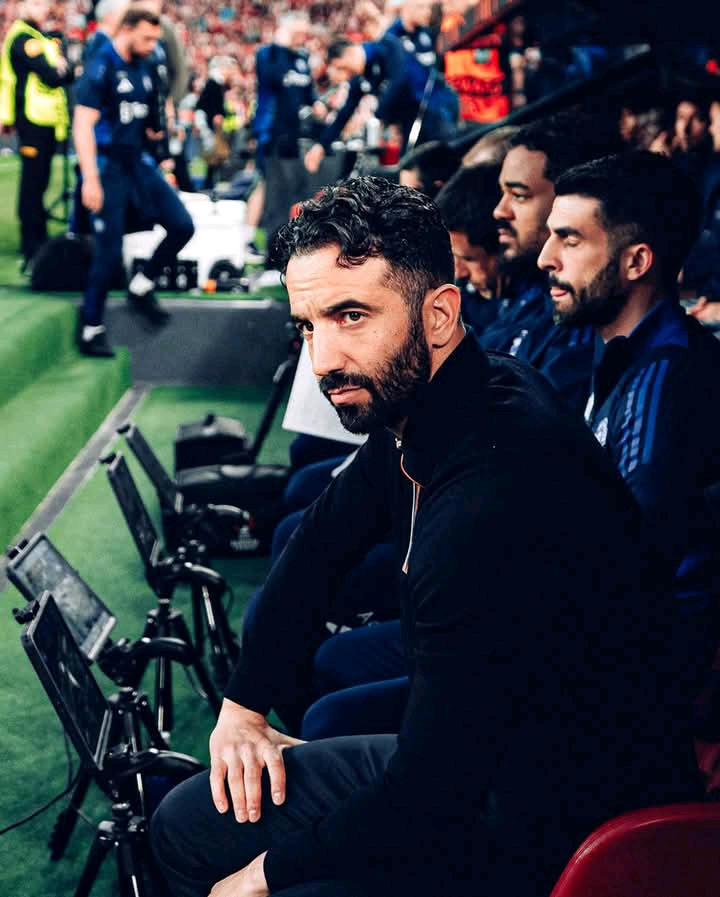Ruben Amorim is nearing the first anniversary of his debut as Manchester United’s head coach and the past 12 months have been anything but predictable. His appointment last November just days after Erik ten Hag was dismissed was meant to mark a bold reset for the club. Young, articulate and highly rated after his success at Sporting CP, Amorim arrived with big expectations and an even bigger tactical shift: a commitment to a back three that United were not accustomed to.
The excitement around his unveiling quickly collided with the reality of United’s struggles. His debut season brought painful lows including losing the Europa League final to Tottenham, recording the club’s worst ever Premier League finish and crashing out of the EFL Cup at the hands of a fourth tier side. The formation became the lightning rod for criticism especially when results refused to improve.
Throughout the turbulence, Amorim remained firm. The system wasn’t the problem, he argued. The team needed time to master his ideas. But as United’s form dipped, outside noise grew louder. Twice last season, their rolling 12 game Premier League points per game average fell to 0.83, the worst post Ferguson slump. A further dip to 0.75 early this season painted an even harsher picture, far below the 1.42 average that preceded Ten Hag’s sack.
Still, this season has brought a subtle shift. United look more stable, more organised and at least recently more productive. Heading into Monday’s trip to Everton, their rolling average has climbed to 1.75, their highest since late 2023. But even that rise is new and fragile, making it difficult to judge whether the progress is permanent or a brief uptick.
There are brighter signs in attack. Last season, United averaged 1.24 non penalty expected goals per match under Amorim. This season, that has risen to 1.48, a 20 percent improvement and currently the sixth best mark in the league. New arrivals Bryan Mbeumo, Matheus Cunha and Benjamin Sesko have helped lift the team’s creative output even though Cunha hasn’t hit full stride and Sesko is now injured.
Defensively, the picture is less encouraging. United have allowed 16.7 non penalty xG, second only to Burnley. Their per game xGA is also notably worse than last season. However, context matters. United were handed the fifth toughest opening schedule according to Opta’s Power Rankings, already facing Arsenal, Manchester City, Chelsea, Liverpool and Tottenham.
The mentality of the team might be the biggest indicator of change. United have developed a habit of altering results in the dying minutes, turning draws into wins or defeats into draws in three of their last four league matches. Only twice before in their Premier League history have they managed such a stretch of late decisive goals. Even in their recent 4 to 2 win over Brighton, Mbeumo’s stoppage time strike felt like the final stamp of a stronger and more resilient side.
They have also spent significantly more time in winning positions this season, almost 500 minutes already, surpassing their total under Amorim last season and closing in on their full tally from 2024 to 25. That is a major shift for a team that spent most of last year chasing games.
So yes, there is progress. And yes, there is still plenty to worry about. United are fitter, more structured and mentally sharper, but the flaws that defined the early stages of Amorim’s tenure haven’t vanished. They are simply less visible at the moment.
The upcoming run of fixtures, far more manageable than the brutal stretch they have just survived, should reveal what this team truly is. And with only 18 months left on his contract, Amorim is entering the period where potential must turn into proof.
United’s last year under him hasn’t been a failure, but it hasn’t silenced the sceptics either. The margins are closing. Now comes the real test.
Should we send you latest update about your favourite sports and team?
Enter you email in the box below and hit the subscribe button to join our teaming 876+ sports community.
